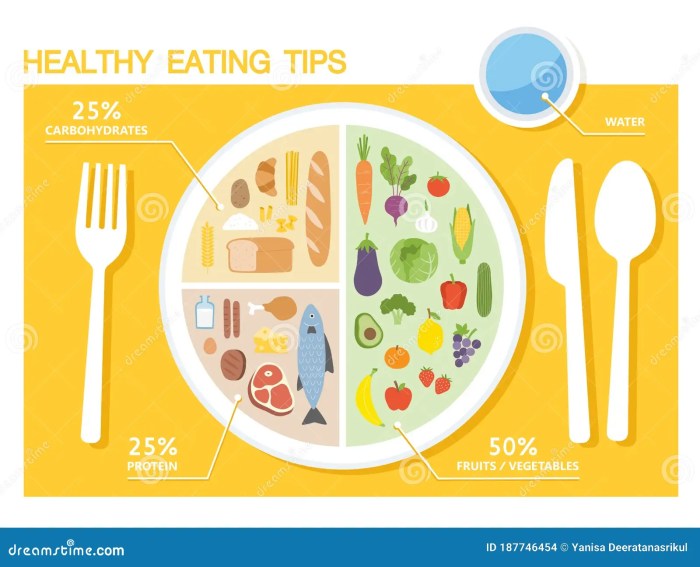Balanced Diet Tips sets the stage for this enthralling narrative, offering readers a glimpse into a story that is rich in detail with american high school hip style and brimming with originality from the outset.
Embark on a journey to discover the secrets of maintaining a balanced diet and unlocking a healthier lifestyle.
Importance of a Balanced Diet

Eating a balanced diet is crucial for maintaining overall health and well-being. It provides the necessary nutrients that our bodies need to function properly and stay healthy.
Essential Nutrients in a Balanced Diet
A balanced diet should include a variety of nutrients, such as:
- Proteins: essential for building and repairing tissues
- Carbohydrates: main source of energy for the body
- Fats: important for brain function and absorbing vitamins
- Vitamins: crucial for various bodily functions
- Minerals: necessary for bone health, muscle function, and more
Impact on Energy Levels and Metabolism
Maintaining a balanced diet can help regulate energy levels throughout the day. By consuming a mix of carbohydrates, fats, and proteins, the body can efficiently convert food into energy. Additionally, a balanced diet supports a healthy metabolism, which is essential for maintaining a healthy weight and overall well-being.
Components of a Balanced Diet: Balanced Diet Tips

Eating a balanced diet is essential for overall health and well-being. It involves consuming a variety of foods from different food groups in the right proportions to provide the necessary nutrients for the body to function optimally.
Main Food Groups in a Balanced Diet, Balanced Diet Tips
- Fruits: Rich in vitamins, minerals, and antioxidants, fruits are essential for good health. Aim to include a variety of fruits in your diet to benefit from different nutrients.
- Vegetables: Packed with fiber, vitamins, and minerals, vegetables are crucial for maintaining a healthy body. Make sure to eat a colorful mix of vegetables to get a wide range of nutrients.
- Whole Grains: Whole grains provide complex carbohydrates, fiber, and essential nutrients. Choose whole grain products like brown rice, whole wheat bread, and quinoa for added nutritional benefits.
- Lean Proteins: Protein is essential for muscle repair and growth. Opt for lean protein sources like chicken, fish, tofu, and legumes to keep your body strong and healthy.
- Healthy Fats: Include sources of healthy fats like avocados, nuts, seeds, and olive oil in your diet. These fats are important for brain function, hormone production, and overall health.
Tips for Achieving a Balanced Diet
Eating a balanced diet is essential for overall health and well-being. Here are some practical tips to help you achieve a balanced diet:
Meal Planning
Meal planning is key to ensuring you get all the necessary nutrients in your diet. Try to include a variety of foods from all food groups in your meals. Plan your meals ahead of time to avoid unhealthy food choices when you’re hungry.
Incorporating Variety and Diversity
Incorporating a variety of foods in your diet not only ensures you get all the necessary nutrients but also makes your meals more enjoyable. Try to include different colors, textures, and flavors in your meals to keep things interesting.
Significance of Hydration
Hydration is often overlooked when it comes to maintaining a balanced diet. Drinking an adequate amount of water is crucial for proper digestion, nutrient absorption, and overall health. Aim to drink at least 8-10 glasses of water per day to stay hydrated.
Benefits of a Balanced Diet
Eating a balanced diet comes with a multitude of benefits that go beyond just physical health. It can positively impact weight management, reduce the risk of chronic diseases, and even improve mood and overall well-being.
Positive Effects on Weight Management
- By consuming a variety of nutrients in appropriate portions, a balanced diet can support weight loss or maintenance goals.
- Including fruits, vegetables, whole grains, lean proteins, and healthy fats can help regulate metabolism and prevent overeating.
- Regularly eating balanced meals can also provide sustained energy levels, making it easier to engage in physical activity and burn calories effectively.
Reducing Risk of Chronic Diseases
- Research shows that a diet rich in fruits, vegetables, whole grains, and lean proteins can lower the risk of heart disease, diabetes, and certain types of cancer.
- Consuming foods high in antioxidants, fiber, and omega-3 fatty acids can help combat inflammation and oxidative stress, key factors in chronic disease development.
- Limiting processed foods, added sugars, and unhealthy fats can also contribute to better overall health and disease prevention.
Improving Mood and Well-being
- A balanced diet not only nourishes the body but also supports brain function and mental health.
- Eating nutrient-dense foods can enhance neurotransmitter production, promoting feelings of happiness and reducing the risk of mood disorders.
- Staying hydrated, consuming adequate vitamins and minerals, and avoiding nutrient deficiencies can lead to improved cognitive function and overall well-being.